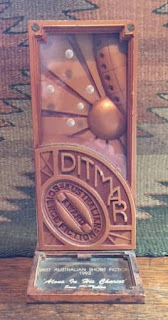 |
| The Ditmar Award is almost as old as the Nebula, and recently recognized J.S. Breukelaar's "The Bridge." (Image via BlackGate) |
So why is there no national award recognizing the best science fiction published by authors from the United States?
It could be argued that this is a reflection of American exceptionalism or imperialism.
The Hugo Award — when it was established in 1953 — may have billed itself as celebrating the world’s greatest science fiction, but that was for a limited definition of “world.” This was a “world” that extended no further north than Toronto, no further east than London, and no further south or west than Los Angeles. American cultural hegemony was baked into the DNA of the award.
An American national SFF award was not seen as necessary, because the Hugos existed.
To date 84.2 per cent of all winners, and 84.5 per cent of the authors represented in the prose categories (short story, novelette, novella, novel and series) were born in the United States. If anything, these statistics understate the level of American dominance, given that the non-American 15 per cent includes figures like Isaac Asimov (born in Russia), Algis Budrys (born in Germany) and Ursula Vernon (born in Japan). If the goal of the Hugo Awards is to represent the best science fiction in the world, then we cannot limit ourselves to works by American authors.
It can be argued that American dominance might have eased slightly in recent years. But even over the most recent three awards ceremonies, 76 per cent of Hugo finalists in the prose categories were still Americans.
Despite a slightly increasing global reach of Worldcon over the past 20 years, clearly, the award’s early focus on America and on American SFF remains.
And this now feels like a disservice to the genre as a whole. The list of iconic SFF writers who did not primarily write in English, and who consequently never got even a whif of Hugo recognition is long. Among others, we’d mention Japan’s Kobo Abe, France’s Pierre Boule, Brazil’s Jerônymo Monteiro, France’s Bernard Werber.
 |
| Elia Barceló is among the best-known Spanish authors and has published best-selling works of SFF. But the Hugo Awards have yet to recognize her work. (Image via Zendalibros.com) |
Put another way, the lack of an American SFF award ends up disprivileging non-American authors.
But it’s a sword that can cut both ways.
This year, with Worldcon being held in China for the first time, there have been more nominating ballots than ever before received from science fiction fans whose first language is not English. There is consequently a real chance that the Hugo Award ballot may primarily celebrate Chinese-language works.
If this comes to pass, and if deserving works of American science fiction are denied recognition as a consequence, we should not blame the Chinese fans who engaged with the Hugos. The fault belongs with all of us in North American fandom for trying to have our award be global, but still wanting to be the only ones who can win it.
Regardless of what the shortlist looks like in 2023, the Hugos would be improved by the existence of a national science fiction award in the United States.
As much as Worldcon likes to think of itself as a “World” event, it seems pretty clear that for the first seven decades that it existed, the Hugo Award has steadfastly resisted the global reach of fandom.
If the Hugo Award is to be a truly “World” award, American fandom may need to relinquish it … by establishing an American award for American fiction.

I haven't really been concerned about the Hugos for some years, and with the recent wave of wokeness that has overtaken most of the professional areas of s-f (and all too many of the fannish ones), I have very little regard for them now. It's nice when someone I think deserving gets nominated, or better yet wins, though I seldom recognize many of the names anymore. The field has exploded with authors and artists, nearly all of whom have avenues to public recognition. The coveted rocket statuettes are more a marketing tool than anything else today, a cover blurb that boosts sales rather than any patent proof of quality content. I really wish they meant more than that, as they once did. But that will never happen again in a world where everyone gets rewarded for participation. Today it seems hard to find writers who can't boast of receiving a prize or award from some group. The only thing special about the World Science Fiction Awards in this age is that the Hugos are still the most recognized honor in s-f, kind of like the copyrighted Band-Aid brand name in a wide field of similar self-adhesive bandages. The excitement is gone. Maybe a United States (NOT American) award would be a good idea, but it would also (and I think rightly) diminish what prestige is left to Uncle Hugo's namesake, just as having an annual U.S. national convention (which I might support) would detract from the Worldcon.
ReplyDeleteI for one welcome the recognition of authors from abroad. One of the things that's bugged me is how, when WorldCon is held in North America, the slate of nominees has in the past often been mediocre, not because better nominees aren't available, but because the bulk of North American fandom isn't aware of deserving work outside of our own parochial borders. This new development can only be an improvement.
ReplyDeleteThe Nebulas are the closest to the US recognition you describe. The Hugos are a fan-based award, a populist/popularity contest. It makes sense that those in China who will be attending and paying for the privilege of nominating and voting will have the lion's share of influence.
ReplyDelete